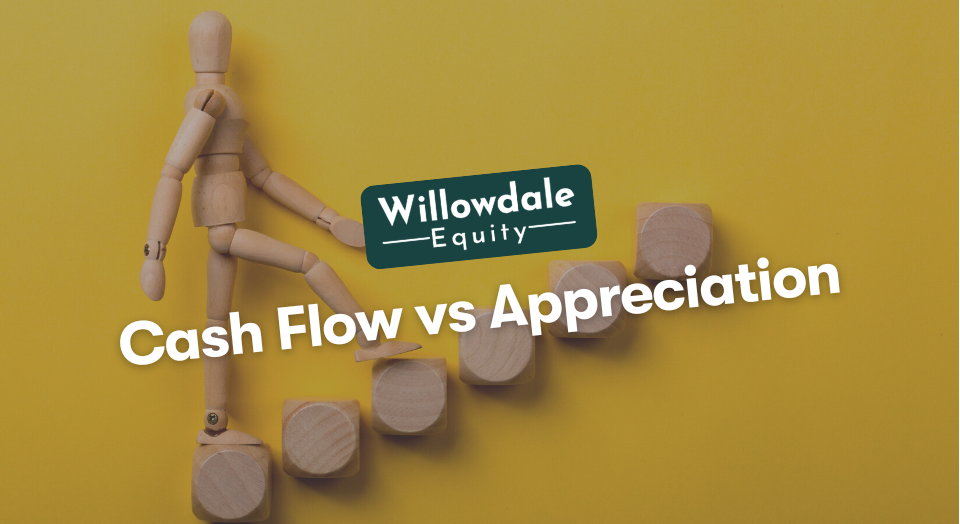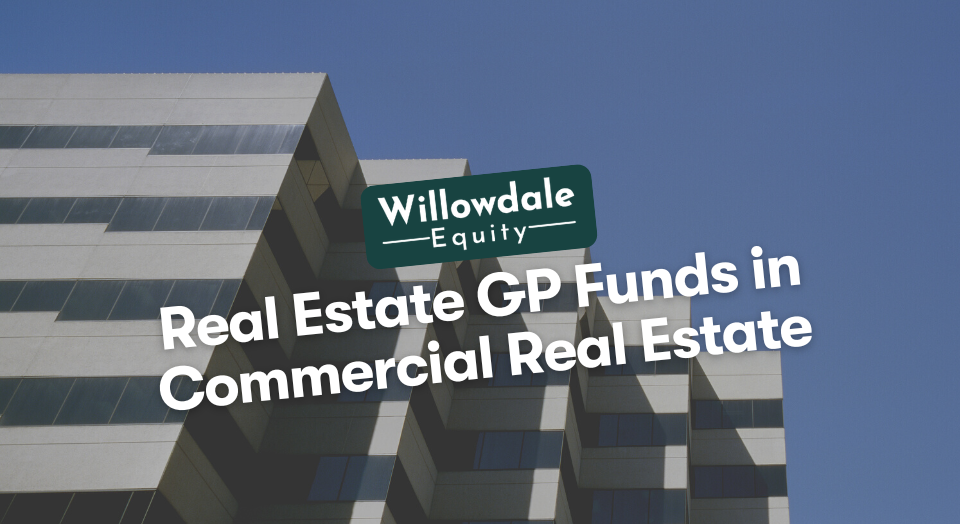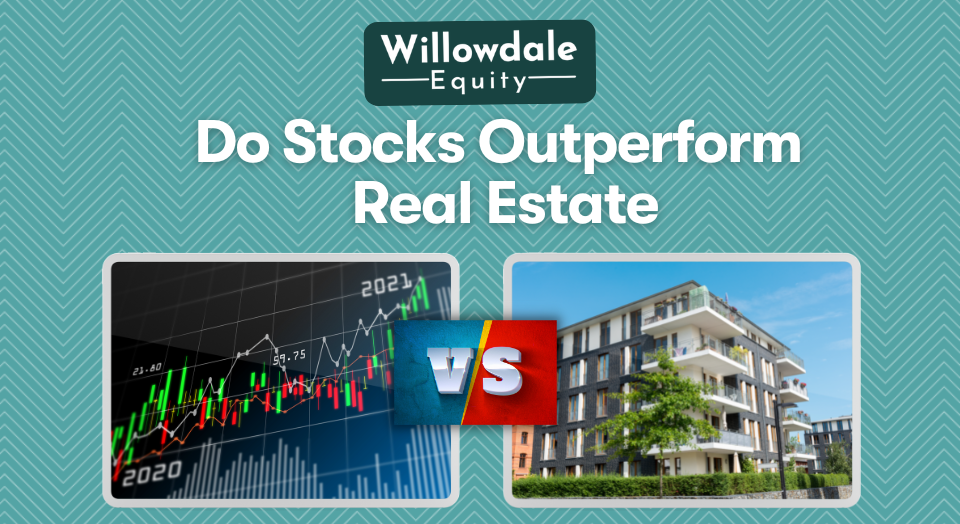
Investing for Cash Flow vs Appreciation – Can you have both?
This article is part of our guide on what a good cap rate is for multifamily, available here.
Can you invest for both cash flow and appreciation? While the goal is always a nice profit at the end of the day, you may be unsure about the type of profit to strive for. Here’s what real estate investors need to know about investing for cash flow vs appreciation.
Key Takeaways
-
Many people live off the positive cash flow from their properties. It can also be used to finance future properties to create an endless cycle of passive income from cash flow. Positive cash flow can also be tucked away to cover property expenses that may pop up in the future.
-
If your existing property is steadily generating positive cash flow, you’re more likely to get approved for financing for additional properties.
-
While some investors focus on what they can bring in every month from a property, appreciation investors are looking for properties that will increase in value enough to change their personal-wealth brackets eventually
Positive Cash Flow Investing
Investing for positive cash flow focuses on finding properties that will generate a percentage back as cash flow. Cash flow from a rental property is the money left over from the rent collected after all bills associated with the property have been paid. Positive cash flow simply means that the money flowing in is greater than the expenses going back into the property. This leads to the list of reasons why investing for cash flow can be a good thing.
Advantages of Investing for Cash Flow

Investing for positive cash flow puts real estate investors in a very stable position compared to almost any other investment strategy. Here’s a look at the benefits:
- Passive Income: Many people live off the positive cash flow from their properties. It can also be used to finance future properties to create an endless cycle of passive income from cash flow. Positive cash flow can also be tucked away to cover property expenses that may pop up in the future.
- Stability During Economic Downturns: When stocks turn downward, having a tangible asset generating positive cash flow becomes very valuable.
- Protection Against Inflation: Rents generally keep up with the pace of inflation. This makes rental income one of the only truly inflation-proof revenue sources.
- More Lending Power: If your existing property is steadily generating positive cash flow, you’re more likely to get approved for financing for additional properties.
The key to benefiting from investing for positive cash flow is to accurately calculate returns. Investors need to have an impeccable reading on how much money goes out from the property every month.
While conventional wisdom says that cash flow is king in property investing, what you’ll read next about investing for appreciation could open up your perspective to another option.
Appreciation Investing
Appreciation investing means investing in a property that is likely to increase in value over time. While most properties will naturally increase in value over time, appreciation investors tend to focus more on the market they’re investing in over the specific property they’re investing in. This might mean picking a fixer-upper in a “hot” area with the intention of putting in some work to boost its value.
Let’s say you find an “ugly duckling” in a primary market for growth somewhere in the Southeast. In this case, we’ll use the example of a multifamily property in Atlanta. You’re essentially “betting on the market” with this property because you believe that the property’s value will continue to increase as Atlanta’s market rent grows and becomes more competitive based on various fundamental trends.
Real estate appreciation investing is a “long game” compared to the cash flow strategy. You’re looking ahead to what a property might sell for 10, 15, or 20 years down the line instead of only caring about the cash it can start generating for you today. Next, look at why a real estate investor would instead focus on appreciation in an investment property.
Advantages of Investing for Appreciation
Appreciation can set investors up for significant wealth if they’re patient enough. Here’s a look at the benefits.
- Larger Gains: While some investors focus on what they can bring in every month from a property, appreciation investors are looking for properties that will increase in value enough to change their personal-wealth brackets eventually
- Large Cash-Out Refinance: Investing for appreciation doesn’t just pay off when it’s time to sell. Investors can also cash out the equity that builds when a property sees significant increases in value.
- Long-Term Wealth: Investing in a property with the potential for appreciation is how many people create long-term wealth that funds everything from early retirement to a lifetime of travel.
- Tax Advantages: For investors focused on moving to bigger and better properties, it’s possible to use the 1031 exchange loophole to avoid paying capital gains taxes when selling a property that has appreciated to fund a new sale. Or by simply leveraging the large “paper losses” from the depreciation to shelter income generated from the asset.
A property that has appreciated can easily become the most stable asset in your portfolio. While protection against inflation is one of the perks of cash-flowing property, the truth is that this benefit also applies when investing for appreciation because property tends to retain value better than stocks. Next, we’ll dig a little deeper into forced appreciation to see how investors ensure appreciation happens.
What is Forced Appreciation?
Forced appreciation occurs when you add value to an existing property. How does an investor do this? There are actually three main ways.
The first way to force appreciation on a rental is to bring rents up to match current market rates. If rents haven’t been raised at the property in years, compare local rents to see where they should be. What if rents are already where they should be? This is where investors need to consider adding improvements to the property to provide a better product to tenants to justify the rent increases.
The second way is to look for ways to lower operating costs. This often means switching service providers for various needs around the property, lowering unnecessary payroll, renegotiating pricing with some of your vendors, or reducing some repair items to name a few.
The third method for forcing appreciation adds other sources of income within the rental property. This can be as simple as offering upgraded packages or doing things like creating a paid laundry area, charging admin fees, move-in fees, pet fees, or leasing out additional parking spaces.
With some familiarity with cash flow versus appreciation under your belt, it’s time to decide which is the better strategy.
So Which is Better, Cash Flow or Appreciation?

The fact that both rental rates and property values are outpacing inflation at the moment means that cash flow investments and appreciation are both smart strategies. If the goal is to begin generating revenue today, rental properties that are cash flow positive are a “job” that produces a steady income.
However, investing for appreciation is for investors willing to wait for a big payday down the road. Of course, aspiring investors ready to take on a property for the first time might be wondering if it’s possible to do both simultaneously. That’s what we’ll answer next.
Can you have both Cash Flow and Appreciation?
Simply put, investors can pull off investing for cash and appreciation simultaneously. How can they do it? The multifamily asset class provides the opportunity to catch both. If you get in the right market, you’ll be able to generate cash flow from rents right now while watching the value of a property explode over time.
The first focus is on identifying a market with positive growth projections. Emerging markets where property values are trending upward are essential. Population growth, job growth, newly built headquarters locations, hot restaurant scenes, and other indicators outside of property values are also crucial for predicting winning markets.
Finally, it’s time to look at individual properties within an appreciation-friendly market to find one capable of providing cash flow. It’s okay to compromise some cash flow for long-term value growth if the plan straddles both cash flow investing and appreciation investing. I’ll now answer the common questions about investing for cash flow vs. appreciation.
Frequently Asked Questions About Real Estate Investing Appreciation vs Cash Flow
The answer varies based on an investor’s goal. While cash flow is better if the purpose of a property is to begin generating usable income today, equity is powerful for building long-term wealth that can fund an early retirement.
Cash flow ultimately helps determine a property’s value from an investor’s perspective. A property with negative cash flow won’t generate enough rental income to cover operating expenses. However, some investors focused on long-term appreciation are comfortable with short-term negative cash flow.
Investing for Cash Flow vs Appreciation - Conclusion
The right property in the right market can generate cash flow and appreciation. However, there’s no requirement for a property to do both to be considered a highly valuable asset. Deciding between cash flow vs appreciation all comes down to choosing income in the here and now vs long-term wealth.
Here at Willowdale Equity, we offer passive real estate investment opportunities to investors to invest alongside us. Join the investor club to get access to exclusive investment opportunities today.
Sources:
Interested In Learning More About PASSIVE Real Estate Investing In Multifamily Properties?
Get Access to the FREE 5 Day PASSIVE Real Estate Investing Crash Course.
In this video crash course, you’ll learn everything you need to know from A to Z
about passive investing in multifamily real estate.
We’ll cover topics like earned income vs passive income, the tax advantages, why multifamily, inflation, how syndications work, and much much more!




